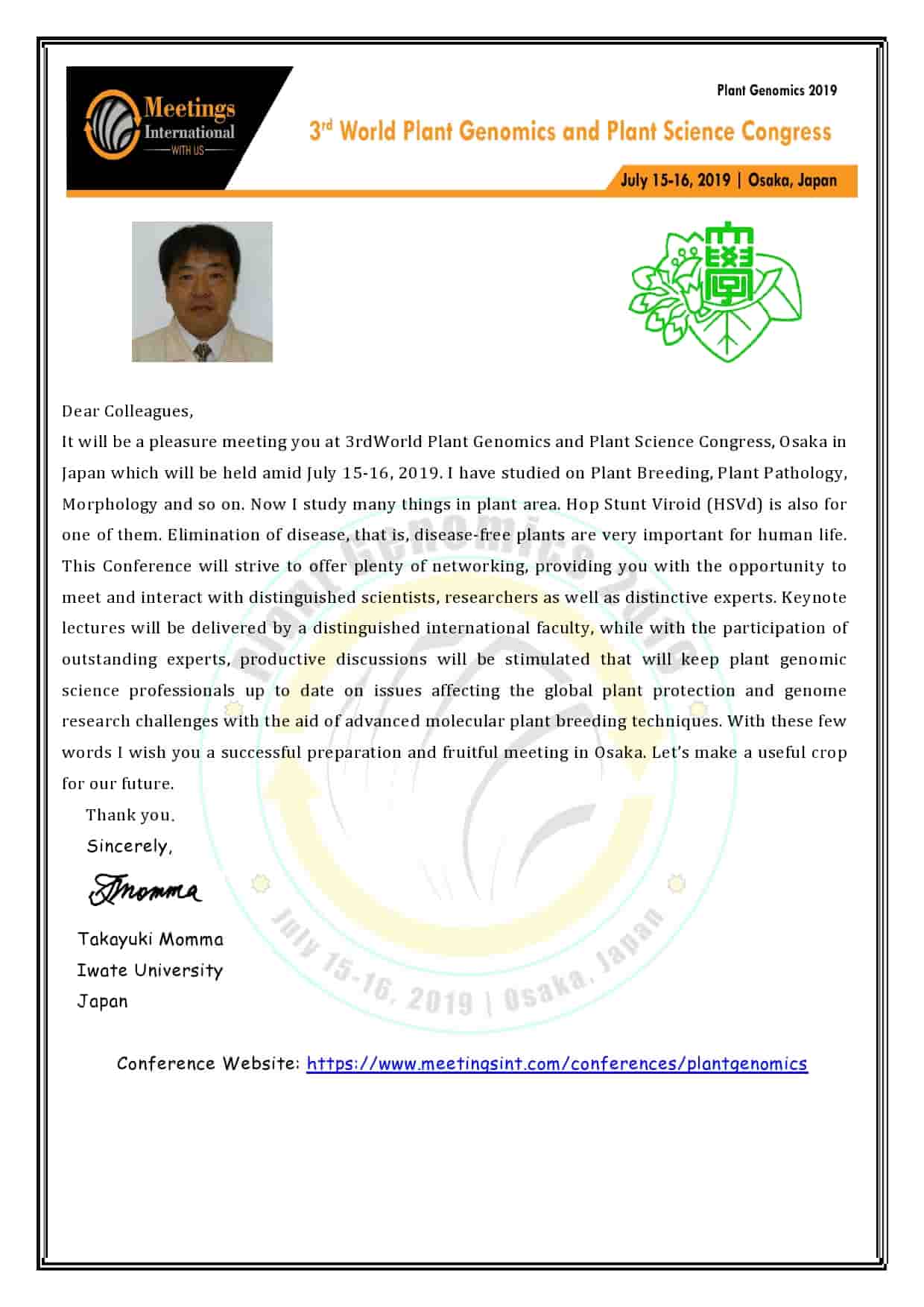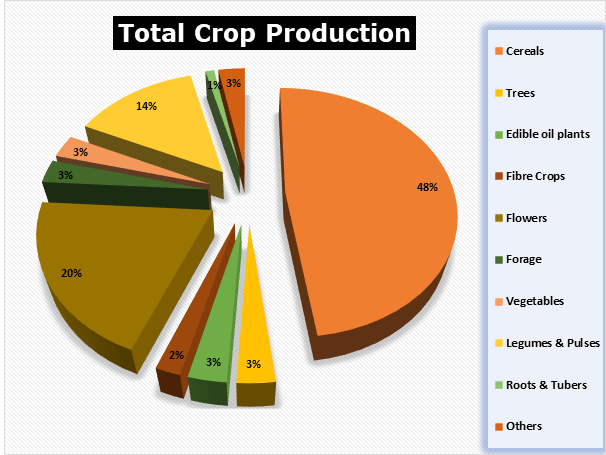
Plant Genomics 2019


3rd World Plant Genomics and Plant Science Congress will be scheduled in Osaka, Japan during July 15-16, 2019 which includes prompt keynote presentations, Oral talks, Workshops/Symposia, Poster presentations and Exhibitions. The theme of the conference is around, “Surpassing the Vision in Plant Genomics and Plant Science”. Plant Genomics Congress is the premier event that brings together a unique and international mix of experts, researchers and decision makers both from academia and industry across the globe to exchange their knowledge, expertise and research innovations to build a world class plant genomics conference. The event focuses on aspects such as breeding, molecular marker development, crop improvement, disease resistance, epigenetics, evolution studies and pathology as well understanding tools to overcome barrier and enable successful data analysis and management. Presentations concentrate not only particular to plant genomics but also crop and forestry research ranging from wheat, barley, maize and rice to potato, tomato, Arabidopsis, biofuels and various fruits.
Session1: Plant Genome Science
Plant Genomics is the field of plant science focused on understanding the sequence, structure and regulation of the genome. With the advent of low cost high-throughput sequencing, investigations of the genome have become much more sophisticated in recent years. It is now possible to compare multiple genomes within a species (pan-genomes) as well as across species (comparative genomics). One of the major challenges facing the field today is developing tools to mine these massive datasets and to visualize the results of comparative studies. As additional data channels become available (e.g. methylation profiles, RNAseq datasets, chromatin maps), new computational tools will also be needed to integrate multiple omics datasets.
Keywords: Plant Genomics Congress | Plant Science Congress | Plant Genomics Meetings | Plant Science Meetings | Plant Genomics Workshops | Plant Genomics Events | Plant Genomics & Plant Science Conferences | Plant Genomics Conferences
Session2: Agricultural Science
Agricultural science is a broad multidisciplinary field of biology that encompasses the parts of exact, natural, economic and social sciences that are used in the practice and understanding of agriculture. Plant Genomics 2019 encourages to showcase your research and development on: production techniques (e.g., irrigation management, recommended nitrogen inputs), Improving agricultural productivity in terms of quantity and quality (e.g., selection of drought-resistant crops and animals, development of new pesticides, yield-sensing technologies, simulation models of crop growth, in-vitro cell culture techniques), Minimizing the effects of pests (weeds, insects, pathogens, nematodes) on crop or animal production systems.
Keywords: Agricultural Science Congress | Plant Science Congress | Plant Genomics Meetings | Plant Science Meetings | Plant Genomics Workshops | Plant Genomics Events | Plant Genomics & Plant Science Conferences | Plant Genomics Conferences
Session3: Plant Proteomics and Plant Science
Proteomics is the large-scale functional analysis of proteins extracted from intact organisms, tissues, individual cells, or cell compartments, at defined timepoints during development or under specific conditions. Plant Proteomics highlights the rapid progress in this field in plants, with emphasis on recent work in model plant species, subcellular organelles, and specific aspects of the plant life cycle such as signalling, reproduction and stress physiology. In addition, Plant Science Congress also include the study of basic concepts and applied aspects of experimental plant biology, genomics, proteomics, plant biochemistry, cell biology, evolutionary biology, functional plant breeding and systems biology. The current trends and future prospects of plant science research encompass the development of disease resistant plants through plant biotechnological innovations can be learnt and shared here at our Plant Genomics Conference
Keywords: Plant Genomics Congress | Plant Science Congress | Plant Proteomics Meetings | Plant Science Meetings | Plant Genomics Workshops | Plant Genomics Events | Plant Genomics & Plant Science Conferences | Proteomics Conferences
Session4: Molecular Plant Breeding
Plant breeding is simple: cross the best parents and identify and recover progeny that outperform the parents. In practice, plant breeding is a three step process, wherein populations or germplasm collections with useful genetic variation are created or assembled, individuals with superior phenotypes are identified, and improved cultivars are developed from selected individuals. A wide diversity of approaches, tailored to the crop species and breeding objectives, have been developed for improving cultivars these breeding methods feature different types of populations, selection procedures, and outcomes. To know more interesting developments happening in this field, Plant Genomics Meeting stands as an excellent platform to discuss with your co researchers and students.
Keywords: Molecular Plant Breeding Congress | Plant Science Congress | Plant Genomics Meetings | Plant Development | Plant Genomics Workshops | Plant Genomics Events | Plant Genomics & Plant Science Conferences | Plant Breeding Conferences
Session5: Stress Signalling in Plants
Plants undergo continuous exposure to various biotic and abiotic stresses in their natural environment. To survive under such conditions, plants exhibit stress tolerance or stress avoidance through acclimation and adaptation mechanisms that ultimately re-establish cellular and organismal homeostasis or reduce episodic shock effects. These abilities involve intricate and complex mechanisms of perception, transduction, and transmission of stress stimuli, allowing optimal response to environmental conditions. The perception of stimuli and their expansion in cells involves signalling molecules such as intracellular calcium and reactive oxygen species, which intensify the action of particular signalling pathways. Unleash your research findings on Stress Signalling in Plants to the world, This can be possible by our Plant Genomics Event
Keywords: Stress Signalling Congress | Plant Science Congress | Plant Genomics Meetings | Plant Science Meetings | Plant Genomics Workshops | Plant Genomics Events | Plant Genomics & Plant Science Conferences | Plant Genomics Conferences
Session6: Plant Nutritional Genomics
Nutritional genomics is a new and promising science area which can broadly be defined as the application of high throughput genomics (transcriptomics, proteomics, metabolomics/metabonomics) and functional genomic technologies to the study of nutritional sciences and food technology. It provides a genetic understanding for how diet, nutrients or other food components affect the balance between health and disease by altering the expression and/or structure of an individual’s genetic makeup. Though the population incresing day by day, many researchers and scientists give their best affords through new research developments and creations under Plant Nutritional Genetics, Here is your scientific forum to express your new challenges at Plant Genomics Sympossium
Keywords: Nutrigenomics Congress | Plant Science Congress | Plant Genomics Meetings | Plant Science Meetings | Plant Genomics Workshops | Plant Nutritional Genomics Events | Plant Genomics & Plant Science Conferences | Nutrition Conferences
Session7: Crop Improvement and Plant Virology
Crop improvement refers to the genetic alteration of plants to satisfy human needs. In prehistory, human forebears in various parts of the world brought into cultivation a few hundred species from the hundreds of thousands available. Through a long history of trial and error, a relatively few plant species have become the mainstay of agriculture and thus the world's food supply. Plant viruses are wide spread and economically important plant pathogens. Plant viruses consist of a nucleoprotein in that multiplies only in the living cells of a host .The presence of viruses in host cells often results in disease,400 or more viruses are known to attack plants.
Keywords: Plant Virology Congress | Crop Science Congress | Plant Genomics Meetings | Plant Science Meetings | Plant Genomics Workshops | Plant Genomics Events | Plant Genomics & Plant Science Conferences | Plant Genomics Conferences
Session8: Plant Biotechnology
Plant Biotechnology is a set of techniques used to adapt plants for specific needs or opportunities. Plant Biotechnology applies technological methods to biological organisms. Plant biotechnology can be defined as the introduction of desirable traits into plants through genetic modification.
Keywords: Plant Biotechnology Congress | Plant Science Congress | Plant Genomics Meetings | Plant Science Meetings | Plant Genomics Workshops | Plant Genomics Events | Plant Genomics & Plant Science Conferences | Technology Conferences
Session9: Plant Morphology and Plant Metabolism
Plant morphology deals with both the vegetative structures of plants, as well as the reproductive structures. It includes plant development, floral morphology pollination and fertilization. Plant morphology provides an overview of the science of studying the external form of plants. Plant metabolism includes the complex of physical and chemical events of photosynthesis, respiration, and the synthesis of organic compounds.
Keywords: Plant Morphology Congress | Plant Science Congress | Plant Genomics Meetings | Plant Science Meetings | Plant Genomics Workshops | Plant Genomics Events | Plant Genomics & Plant Science Conferences | Pollination Conferences
Session10: Plant Genetics and Genomics market
Plant Genetics is a wide range term. There are different kinds of hereditary qualities as a rule. The idea of hereditary qualities is the branch of science that arrangements with heredity, particularly the systems of innate transmission and the variety of acquired attributes among comparative or related life forms. Genomics is the investigation of the hereditary material or genomes of a life form. Investigators figure the Global Genomics market will develop at a CAGR of 11.21% over the period 2013-2018. As per the report, the most essential driver of the market is an expansion in the interest for consumables.
Keywords: Genomics Congress | Plant Science Congress | Plant Genetics Meetings | Plant Science Meetings | Global Genomics Market | Plant Genomics Events | Plant Genomics & Plant Science Conferences | Plant Genomics Conferences
Why Osaka?
Osaka as one of the world's biggest urban areas, Osaka's populace thickness demonstrates intriguing examples because of the modern zones around the narrows, historically significant area only west of there, and territories of populace development settled in among the mountains adjacent Census information uncovers that populace thickness shifts observably from territory to zone. Little region statistics information completes a superior employment portraying where the swarmed neighbourhoods are. In this guide, territories of most elevated thickness surpass 30,000 people for every square kilometer. High-thickness territories surpass 7,000 people for each square kilometer. High thickness territories surpass 5,200 people for every square kilometer. The last classes break at 3,330 people for each square kilometer, and 1,500 people for every square kilometer The Agricultural Trade Office of the U.S. Government office in Osaka might want to exhibit an Agricultural Products Trade Showcase highlighting basically new-to-advertise sustenance and refreshments in Japan. This sustenance and horticultural grandstand can enhance U.S. organizations discover purchasers and wholesalers - extending market perceivability and deals openings with outside purchasers. This exhibit occasion can help your business in systems administration, associating and one-on-one gatherings, publicizing/advancements with quality merchants and purchasers from the Osaka zone, inside another market
Agriculture in Japan
Japan had the world's third-largest economy with a total gross domestic product (GDP) of US$4.1 trillion in 2015. Real GDP growth was 0.4% in 2015, a rate that is anticipated to increase to 0.9% throughout 2016. Japan has a large middle class and one of the oldest populations in the world. Individuals aged 65 and over are the largest demographic, representing over 26.7% of the total Japanese population in 2015. An aging population can pose challenges to the market, especially as these older consumers increase in number and their dietary requirements change. Furthermore, older generations require more innovative products, such as easy-to-use packaging or smaller portions. Health-related products, such as functional foods, are also of very high importance. Consequently, opportunities to better serve this segment of the population are emerging in several packaged food categories. Packaged food sales were valued at US$158 billion in 2015 and are anticipated to reach US$164.2 billion by 2020.
Current analysis of crop production in Asia:

Significant Plant Science Associations around the world
- American Society of Plant Biologists , America
- Australian Society of Plant Scientists , Australia
- Argentinean Society of Plant Physiology, Argentina
- American Society of Agronomy, USA
- African Crop Science Society, Africa
- Brazilian Society of Plant Physiology, Brazil
- Plant Society of China, China
- Canadian Society of Plant Biologists, Canada
- Chile's National Network of Plant Biologists, Chile
- Chinese Society of Plant Biology, China
- Harvest Science Society of America, USA
- Harvest Science Society of China, China
- European Association for Research on Plant Breeding, Europe
- European Plant Science Organization, Poland
- Alliance of European Societies of Plant Biology, Germany
- Hereditary qualities Society of China, China
- Worldwide Society of Plant Pathology, USA
- Indian Society of Plant Physiology, India
- Worldwide Crop Science Society, USA
- Worldwide Society for Horticultural Science, USA
- Irish Plant Scientists' Association, Ireland
- Worldwide Society for Plant Molecular Biology, USA
- Japanese Society for Plant Cell and Molecular Biology, Japan
- Japanese Society of Plant Physiologists, Japan
- Korean Society of Plant Biologists, Korea
- New Zealand Society of Plant Biologists, New Zealand
Universities and Research institutes in Asia:
- University of Tokyo, Japan
- National University of Singapore, Singapore
- Peking University, China
- Tsinghua University, China
- Seoul National University, South Korea
- University of Hong Kong, Taiwan
- National Taiwan University, Taiwan
- Tokyo Institute of Technology, Japan
- KAIST - Korea Advanced Institute of Science and Technology, Korea
- Osaka University, Japan
- Fudan University, China
- Tohoku University, Japan
- University of Science and Technology of China, China
- Nanjing University, China
- Nagoya University, Japan
- The Chinese University of Hong Kong (CUHK), China
- Shanghai Jiao Tong University, China
- Hokkaido University, Japan
- Pohang University of Science and Technology, South Korea
- Zhejiang University, China
- Indian Institute of Science, India
- Kyushu University, Japan
- Indian Institute of Technology Bombay, India
- Sungkyunkwan University, South Korea
- National Tsing Hua University, Taiwan
- Yonsei University, South Korea
- University Putra Malaysia, Malaysia
- Bandung Institute of Technology, Indonesia
Top Universities in Middle East:
- Middle East Technical University, Turkey
- King Abdullah University of Science and Technology, Saudi Arabia
- Al Ain University of Science and Technology, United Arab Emirates
- Middle East Molecular Biology Sources – MEMBS, United Arab Emirates
- Ras al-Khaimah Medical and Health Sciences University, United Arab Emirates
- American University of the Middle East, Kuwait
- Khalifa University, United Arab Emirates
- King Saud bin Abdulaziz University for Health Sciences, Saudi Arabia
- Tel Aviv University, Israel
- Bar-Ilan University, Israel
- Kuwait University, Kuwait
Top Universities in Europe:
- University of Cambridge, England
- University of Oxford, England
- The University of Sheffield, England
- University in Uppsala, Sweden
- University in Bern, Switzerland
- University in Uppsala, Sweden
- University in Kortrijk, Belgium
- Public university in London, England
- The Norwegian University of Life Sciences, Norway
- University in Fribourg, Switzerland
- Leiden University, Netherlands
- University of Bonn, Germany
Top Plant Science and Plant Genomics Universities in USA:
- University of Arizona the School of Plant Sciences, Arizona
- Penn State University, Pennsylvania
International Research Centres for Plant Sciences and Plant Genomics:
- Center for Green Roof Research, North America
- Center for Sports Surface Research, USA
- Center for Turf grass Science, USA
- National Institute of Genetics, Japan
- National Institute for Basic Biology, Japan
- Riken Centre for Developmental Biology, Japan
- National Institute of Plant Genome research, India
- Zurich-Basel Plant Science Center, Switzerland
- Dahlem Centre of Plant Sciences, Germany
- Institute for Bio- and Geosciences Plant Sciences, Germany
- GMI - Gregor Mendel Institute of Molecular Plant Biology, Austria
- European Plant Science Organisation, Belgium
- L'institut Des Sciences Des Plantes - Paris-Saclay, France
- European Bioenergy Research Institute, England
A Unique Opportunity for Advertisers and Sponsors at this International event:
The worldwide market for genomics is relied upon to achieve USD 22.1 billion by 2020, developing at an expected CAGR of 10.3% from 2014 to 2020, as indicated by another examination by Grand View Research, Inc. Genomics assume a basic part in the field of irresistible infection testing by empowering the utilization of quick and compelling outcome rendering sub-atomic indicative tests. This, combined with developing commonness of irresistible maladies and healing centre obtained diseases is required to drive advertise development amid the conjecture time frame. Other driving elements for this market incorporate diminishing costs of DNA sequencing, expanding interest for genome examination in creature and plant feedstock, broad nearness of both private and open outer subsidizing projects and developing patient mindfulness levels. Also, nearness of undiscovered development openings in rising nations, for example, India, Brazil and China and the expanding wellbeing mindfulness are relied upon to serve this market as future development openings.
Genomics based diagnostics ruled the general market as far as income at 36.4% out of 2013 significantly inferable from the nearness of a moderately bigger number of R&D programs. Genomics construct customized drug fragment with respect to the next hand is required to develop at the speediest CAGR of more than 12.0% from 2014 to 2020 because of expanding interest for populace based restorative arrangements and resulting increment in R&D activities.
- Plant Genome Science
- Agricultural Science
- Plant Proteomics and Plant Science
- Molecular Plant Breeding
- Stress Signalling in Plants
- Plant Nutritional Genomics
- Crop Improvement and Plant Virology
- Plant Biotechnology
- Plant Morphology and Plant Metabolism
- Plant Genetics and Genomics Market
- Phytopathology and Plant Protection
- Journal of Plant Physiology & Pathology
- VEGETOS: An International Journal of Plant Research
- Journal of Soil Science and Plant Health
9 Organizing Committee Members
26 Renowned Speakers
Takayuki Momma
Iwate University
Japan
Wilson Boardman
Micromix Plant Health Limited
UK
Yusuf Leonard Henuk
University of Sumatera Utara
Indonesia
Thomas P. Brutnell
Viridis Genomics Consulting
USA
Ramanjulu Sunkar
Oklahoma State University
USA
Ryoung Shin
RIKEN Center for Sustainable Resource Science
Japan
Rym Fekih
Kobe University
Japan
Robert Caine
The University of Sheffield
UK
Alice Brunazzi
ISI Sementi
Italy
Al-Ghaliya Al-Mamari
Ministry of Agriculture & Fisheries
Oman
Nagesh Kancharla
Reliance Industries Limited
India
Francesco Sunseri
Mediterranea University of Reggio Calabria
Italy
Maria Rosa Abenavoli
Mediterranea University of Reggio Calabria
Italy
Vasileios Fotopoulos
Cyprus University of Technology
Cyprus
Najla Mezghani
National Gene Bank of Tunisia
Tunisia
Abdelnaser Elashry
Research Associate, Strube Research
Germany
Sergio Lanteri
Professor, University of Turin
Italy
Xian Deng
Chinese Academy of Sciences
China
Geraldine P Muncada
University of Eastern Philippines
Philippines
Paul Njiruh Nthakanio
University of Embu
Kenya
Yalcin Kaya
Trakya University
Turkey
Anindya Bandyopadhyay
Syngenta Center of excellence for Genome editing
China
Behnam Derakhshani
National Agriculture and Food Research Organization
Japan
Kaixuan He
Chinese Academy of Sciences
China
Ivan Kabiita Arinaitwe
University of Malaya
Malaysia
Mustafa A. N. AL-Fayyadh
Eskisehir Technical University
Turkey







































